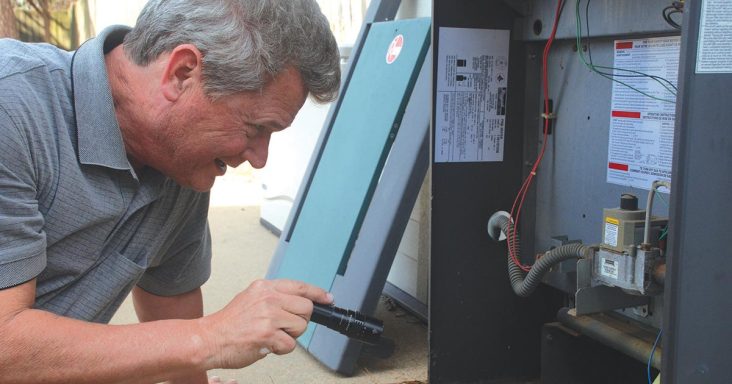Home inspection, appraisal demand stable in Northwest Arkansas
by March 22, 2022 2:21 pm 1,518 views

Home inspector Kyle Rodgers of Siloam Springs inspects a pool water header, which he said he commonly checks in Northwest Arkansas. Rodgers recently was appointed to the Arkansas Home Inspector Registration Board.
According to the National Association of Realtors, fewer homebuyers are waiving appraisal and inspection contract contingencies as they ensure the purchase price is worth the investment amid rising costs and tight inventories.
Still, area real estate executives and inspectors reported steady demand for appraisals and inspections.
Recently, the National Association of Realtors released the results of a Realtor transactions survey that showed the percentage of buyers waiving the inspection contract contingency fell to 19%, from a peak of 27% in July. Meanwhile, the percentage of buyers waiving the appraisal contract contingency declined to 21% in December, from a height of 29% in June.
Between April and June, appraisal and inspection waivers accelerated when sales typically rise, according to the National Association of Realtors.
“Due to tight inventory and with properties selling quickly, the market went into a frenzy as buyers resorted to several measures to outbid other buyers, such as waiving inspection and appraisal contract contingencies, making higher down payments and offering cash,” the organization said in a statement. The recent decline in waivers could be attributed to buyers ensuring “they are getting their money’s worth” as home prices continue to rise.
According to the National Association of Realtors, the median existing-home sales price increased in December by 15.8% to $358,000 from the same month in 2020. A home is a typical family’s most significant investment, accounting for nearly 80% of total family wealth among homeowners, according to the organization’s 2019 Survey of Consumer Finances.

Chris Demarest, president of the Northwest Arkansas Board of Realtors, said he seldom sees contracts in which buyers waive the inspection or appraisal contingencies.
Regarding inspections, Demarest said he’d seen agreements in which buyers have the property inspected but do not require the seller to make any repairs.
“They want to go ahead and find out what they’re up against, in terms of having an inspection done and what the house may have wrong with it,” he said. “That does give the buyer the option to cancel the contract if there’s so much wrong with the house, they won’t go on to take that on.”
Demarest, a Realtor for 22 years and a senior vice president and executive broker for Lindsey & Associates in Fayetteville, said Arkansas real estate contracts have a provision for an inspection to be completed within the first 10 business days of the contract. While inspections are optional, he said home lenders require appraisals. He noted that the period from contract to closing is typically 30 to 45 days.
Demarest said he’s waived inspections on homes he’s purchased and regretted it. “We don’t recommend that you buy a property without having it inspected,” he said.
COMMON CONTINGENCY
Demarest said he sees contracts with an appraisal gap contingency instead of an appraisal waiver. The contingency is commonly for the buyer’s offer amount that exceeds the listed price.
“For instance, someone will make an offer that is $10,000 over the list price and agree to pay $10,000 above appraisal up to the purchase price,” he explained. “That’s the most common thing I think we see around here.”
Demarest said a lack of home inventory has led buyers to compete for homes this way. When a home is listed for sale, he said it receives multiple offers, mostly at or above the list price.
“People are looking for ways to make their offers more attractive,” he said. “And reducing the contingencies is one of the ways to do it. A lot of folks are making offers without the contingency of selling their own home, so their offer looks better with the confidence that they’ll be able to sell their house pretty quickly.”
According to the National Association of Realtors, the percentage of buyers who declined to waive any contract contingencies rose from 21% in June to 40% in December. Other contract contingencies that buyers waived included financial (10%), home sale (8%) and title (1%).
Home inspector Nick Mauldin, owner of Alpha & Omega Inspections in Bentonville, said his business has been impacted due to the low home inventory. He’s been doing inspections for more than four years and completed about 225 inspections last year. He’s planning on up to 250 this year. Still, he’s not seen or heard about buyers declining home inspections.
Another area home inspector who declined to be named said the number of inspections he has completed has been average over the past two years.
INSPECTIONS RISE
Kyle Rodgers, the owner of A+ Home Inspections in Siloam Springs, said his inspections were up in January and February, compared to the same two months in 2021.
Rodgers has been an inspector for 19 years and completed about 5,000 inspections, mainly in Northwest Arkansas. Recently, Gov. Asa Hutchinson appointed Rodgers to the Arkansas Home Inspector Registration Board. His term expires in January 2024.
Rodgers, also president of the Arkansas chapter for the American Society of Home Inspectors, highlighted the importance of an inspection and explained that many people who live outside the area are purchasing homes online before entering the house.
“We go into the house and thoroughly visually inspect, for instance, water heaters,” he said. “We go in the attic…We’ll take the cover off breaker panels, check for wiring inside the breaker panel, check for anything that’s overheated and anything that’s got a visual defect to it.
“We’re checking out things that need to be inspected that cost a lot of money,” said Rodgers, noting foundation settlement issues can cost 10s of thousands of dollars to repair. “We can catch those things prior to people buying the house.”
He added that the $300 to $400 inspection fee could save buyers from purchasing a home that might need significant repairs.
“It’s a snapshot in time,” Mauldin said. “I can tell you what the condition of your house is for those three to four hours that I’m at the house doing the inspection. Hopefully, based off my experience, training and education I can give buyers an idea of what to expect with their house to prepare them, especially when it comes to first-time homebuyers.”
Mauldin added that he offers buyers maintenance recommendations, including how often to paint a home’s exterior, change air filters, and check smoke and carbon monoxide detectors. He said minor maintenance issues neglected over time could become larger when combined.
OTHER FACTORS
According to the National Association of Realtors, another reason for the decline in the contract appraisal and inspection waivers was that appraisals were completed more quickly. In the fourth quarter, contract settlement delays attributed to appraisals fell to 22%, from a peak of 27% in July. In January 2020, appraisals accounted for 15% of the delays. The organization cited that increasing vaccination rates have contributed to more appraisers completing or scheduling an inspection.
Also, a higher share of government-sponsored enterprise mortgage financing might account for the decline in appraisal delays. The financing accounted for 73% of mortgage financing in December, up from 66% in January 2020. Meanwhile, the mortgage financing share attributed to government lenders, such as the Federal Housing Administration, Veterans Affairs and U.S. Department of Agriculture, has fallen to 22%, from 32% before the pandemic started.
In December, about 5% of appraisals were completed via a desktop/automated valuation process. Before the pandemic, government-sponsored enterprise lenders Fannie Mae and Freddie Mac had offered desktop underwriting. In October 2020, the Federal Housing Administration released an automated underwriting system.
“The decline in buyers who are waiving appraisal and inspection contingencies is a healthy trend,” according to the National Association of Realtors. “Buyers should pay for what a home is worth and be informed of potential issues that need to be addressed by the seller or anticipated by the buyer if the buyer wants to take responsibility for addressing this issue at their own cost. If so, the buyer can negotiate for a lower price.”
According to the organization, older homes often have more structural issues, including lead paint, ground shifting and water damage. In the United States, about 53% of owner-occupied homes were built before 1980. The most significant percentages of old houses are in Washington, D.C., (79%), New York (77%), Connecticut (70%), Rhode Island (69%) and Pennsylvania (69%). In Arkansas, 45% of owner-occupied homes were built before 1980.
